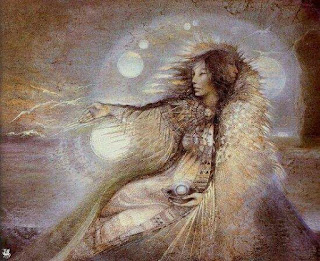There was a party of Gros Ventre Indians who went out for a hunt From Knife River where the old camp was, and while they were hunting, the Assiniboins came and attacked the hunters. Some getaway and were saved. A young man among them looked for his sister and could not find her. So he trailed them to their camp. This man was an Assiniboin who had been a little boy captured by the GrosVentre and made a slave.
Sister
Artist: Susan Seddon Boulet
The girl called him brother but was not really related to him. When all was quiet at night he went through the camp to look for his sister. He came to a big teepee and heard talking. Looking through a hole, he saw two men wounded whom he recognized as his own brothers. Now he had shot two Assiniboin in the conflict (and he recognized these two as the ones he shot). Drawing his robe over his head, he entered and sat down beside their father, who was his father too. The wounded men told their father to fill his pipe and smoke with the stranger. The boy had not forgotten his own language, so he spoke to the old man and said, "Father, it is I." When he told what had happened to him, the father put his hands about his neck and fainted; the mother did the same. When he told them it was he who had shot the two brothers, they all laughed over it. He told them that he was looking for his sister, and the wounded men advised the father to call in the chiefs and tell them about her.
Smoke
Artist: Susan Seddon Boulet
So the chiefs arranged not to move camp for four days, but to have a feast and call together all the slaves taken from theirs Ventre and let them eat. Then they had a dance called the Scalp-Dance, but the sister was not there. According to the old custom, slaves are supposed to belong to the tribe by which they are captured, so the slaves too got up and danced with them. All the slaves knew the young man. They called him "Crow Necklace.
Crow Necklace
Artist: Susan Seddon Boulet
“Before the four days were passed he said to the slaves, "Go steal some moccasins and dry meat and one of these nights we will run away." On the last of the four nights, they were all prepared. They stole sinew and cut pieces of Buffalo hide from the tents for moccasins. It was storming when they left - young women, old, and children, the young women carrying the children on their backs -and they ran North instead of East in the direction from which they came. Coming to a dry lake, they laid down in the deep grass and the snow covered them. Meanwhile, the Assiniboin discovered their absence and tracked after them but could not find them. They came to the lake but, seeing nothing of them, went home except one who stood looking. Crow Necklace crept up and killed him and took his scalp.
Scalp
Artist; Susan Seddon Boulet
That night they went until daylight, traveling North-East until they came to another dry lake thick with grass. There they stayed allay. Four days they traveled in the night and hid all day. By this time they were up at the headwaters. From there they came around toward the Missouri River and came out at a place we call "Timber Coulee." At that time it was full of timber. Crow Necklace was about to push down an old tree which had an Owl's nest on top. An old Owl said, "Don't push that tree or my young ones will get cold. We are the ones who have helped you get around to your home again. It ill be best for you to go back to your own tribe: there you will find chief's daughter waiting to marry you." So when they wanted him to marry some of the women he refused and said, "No! The young ones are my sisters and the old ones are my mothers. The Owl directed him, “After leaving this place, go directly to the Short Missouri to camp, then on to Wood-Trap (right across the river West from here).Here all the Spirits will set traps to catch all kinds of wild animals for you to eat. When you get there, build a tipi out in the bush. Go inside and do not go out, and they will bring you meat themselves." So they did this - fixed up nice and went in. Outside they could hear the noise of butchering going on around them.
Owl
Artist: Susan Seddon Boulet
When the noise ceased they went out and found meat cut up or wrapped in hides and laid up on scaffolds. The Owl told Crow Necklace that they were now not far from the tribe - at the next move they would reach home. The next day they moved until they came to a high hill. Crow Necklace fixed up a skull and painted their faces black. Astley approached, they saw a woman crying on top of a hill and someone pointed her out to Cow Necklace; it was his sister. He called to her, and when she saw him she fainted. Then the whole camp came out to meet them and everybody made much of Crow Necklace. Herold the story of their adventures and brought food for them to eat.
Artist Unkown
All the hides he had asked to have tanned in order to make Medicine after he got back home. Among them was a White Buffalo hide. Softer he had married a chief's daughter as had been foretold, he made Medicine in order to understand all the mysterious beings and leave out none of them. And that cost him everything he had prepared - a hundred moccasins, a hundred robes, and a hundred blankets- everything in hundreds.













